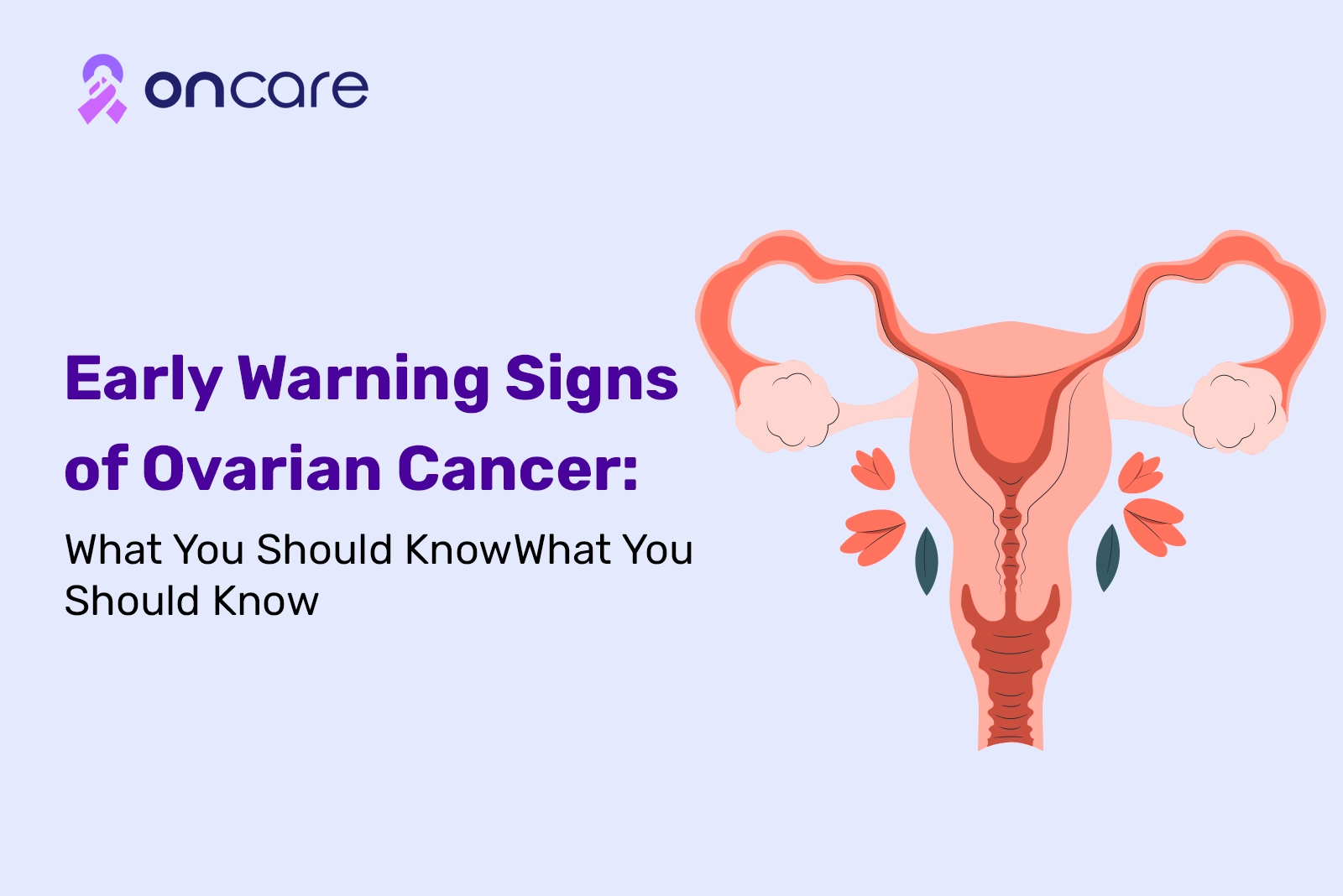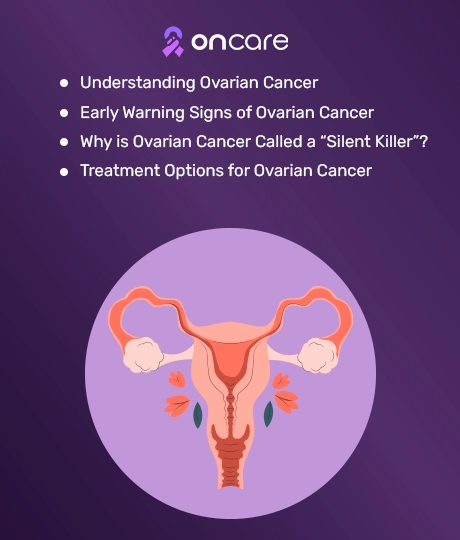Early Warning Signs of Ovarian Cancer: What You Should Know

Ovarian cancer is difficult to detect in its early stages because its symptoms often resemble common digestive or menstrual issues. Many women experience persistent bloating, abdominal discomfort, frequent urination, or changes in appetite without realizing these could be early warning signs. Since these symptoms can be vague and easily overlooked, they often lead to a delayed diagnosis. However, when ovarian cancer is detected early, treatment outcomes improve significantly. Recognizing these signs and seeking medical attention can make a crucial difference. At Oncare, our experienced oncologists use advanced diagnostic tools to detect ovarian cancer at its earliest, most treatable stage. We provide precise screenings and expert treatment options to improve patient outcomes. If you are experiencing persistent symptoms, consult our oncologists for timely evaluation and care.
Understanding Ovarian Cancer
Ovarian cancer occurs when unusual cells in the ovaries grow and spread uncontrollably, leading to tumor formation. It is classified into three main types: epithelial ovarian cancer, which originates in the outer lining of the ovary and is the most common type; germ cell ovarian cancer, which develops in the egg-producing cells and is more prevalent in younger women; and stromal ovarian cancer, which starts in the hormone-producing cells of the ovary. While the exact cause is unclear, certain risk factors increase susceptibility, including age (most cases occur in women over 50), family history of ovarian or breast cancer, genetic mutations like BRCA1 and BRCA2, endometriosis, and prolonged use of hormone replacement therapy.
One of the biggest challenges with ovarian cancer is early detection. Its symptoms, such as bloating, abdominal discomfort, and changes in appetite, are often mild and mistaken for common digestive or menstrual issues. As a result, many cases are diagnosed at an advanced stage when treatment is more challenging. Regular medical check-ups, awareness of symptoms, and timely screenings are vital in improving early detection and increasing the chances of successful treatment and recovery.

Early Warning Signs of Ovarian Cancer
Ovarian cancer symptoms often appear subtle and can be mistaken for common digestive or menstrual issues. However, persistent and unusual changes in the body should not be ignored. Recognizing these early warning signs and seeking medical attention can significantly improve the chances of early detection and effective treatment.
Persistent Abdominal Bloating
If you experience frequent bloating that does not subside over weeks, it could indicate fluid buildup or tumor growth. Unlike occasional bloating caused by diet or digestion, this symptom is continuous and may cause visible abdominal swelling.
Unexplained Pelvic or Abdominal Pain
Pain in the pelvic or lower abdominal region that persists for weeks without apparent cause should be evaluated. This discomfort may feel like menstrual cramps but occurs outside of the normal cycle and does not improve with usual remedies.
Changes in Appetite and Feeling Full Quickly
A sudden loss of appetite or feeling full after eating small amounts can signal ovarian cancer. If this issue persists, it may indicate that a tumor is pressing against the stomach or affecting digestion.
Unexplained Weight Loss or Gain
Sudden and unexplained weight changes, particularly weight loss, can be a red flag. In some cases, weight gain may also occur due to fluid accumulation in the abdomen. If no lifestyle changes account for these fluctuations, medical evaluation is necessary.
Frequent Urination or Increased Urgency
A sudden, frequent urge to urinate, even without increased fluid intake or a urinary tract infection, may be linked to ovarian cancer. A growing tumor can press against the bladder, causing this symptom. Our oncologists specialize in identifying the underlying causes of such symptoms, helping females understand their health concerns and take the necessary steps for further evaluation and care.
Menstrual Irregularities or Abnormal Bleeding
Unexpected changes in menstrual cycles, such as heavy bleeding, spotting between periods, or postmenopausal bleeding, should not be ignored. While many factors can cause irregular periods, persistent changes require medical attention.
Persistent Fatigue and Weakness
Ongoing fatigue that does not improve with rest may indicate underlying health concerns, including ovarian cancer. This exhaustion is often accompanied by weakness and a lack of energy, even with sufficient sleep.
Gastrointestinal Discomfort and Changes in Bowel Habits
Persistent bloating, early satiety, nausea, constipation, or diarrhea, when they develop suddenly and worsen over time, can indicate ovarian cancer. Tumors may press on the intestines and abdominal organs, leading to unexplained digestive issues. Medical evaluation is crucial if these symptoms persist despite dietary or lifestyle adjustments. Early detection improves outcomes, and our oncologists can help determine the cause and the right course of action.
Why is Ovarian Cancer Called a "Silent Killer"?
Ovarian cancer is often referred to as a "silent killer" because its early symptoms are vague and easily mistaken for common digestive or menstrual issues. Bloating, abdominal discomfort, and changes in appetite may appear mild, leading many women to overlook them. Unlike other cancers, ovarian cancer lacks reliable early screening tests, making detection challenging until it reaches an advanced stage. The disease has often spread by the time it is diagnosed, reducing treatment effectiveness. Recognizing subtle warning signs and seeking medical attention early can significantly improve the chances of successful treatment.
Treatment Options for Ovarian Cancer
If diagnosed early, ovarian cancer is more treatable with surgery, chemotherapy, or targeted therapy. Recognizing symptoms like bloating, pelvic pain, and digestive issues can lead to timely intervention. At Oncare, our oncologists provide expert diagnosis and treatment. Below are the most effective treatment options suggested by our experts for ovarian cancer cases:
Surgery
Surgical intervention helps to remove the tumor as much as possible. Procedures range from removing one ovary to a total hysterectomy, depending on the cancer’s progression. In advanced cases, debulking surgery removes visible tumor masses, increasing the effectiveness of other treatments.
Chemotherapy
This treatment uses powerful drugs to destroy cancer cells and prevent their spread. Chemotherapy can enter the body through the veins or be injected directly into the abdominal cavity. (intraperitoneal chemotherapy).
Targeted Therapy
Targeted therapies focus on specific molecules that drive cancer growth. Treatments like PARP inhibitors are particularly effective for women having ovarian cancer with BRCA gene mutations. At Oncare, we provide access to effective targeted therapy, helping patients receive treatment designed to interfere with their ovarian cancer cell growth while preserving their healthy tissues.
Hormone Therapy
Hormone therapy involves medications that block hormones like estrogen, which can fuel the growth of certain ovarian cancers. This treatment is beneficial for stromal tumors, which rely on hormonal signals.
Radiation Therapy
Though not a primary treatment for ovarian cancer, radiation therapy may be used in some instances to shrink localized tumors or relieve symptoms in advanced stages. High-energy beams target and destroy cancer cells, preventing further progression.
Conclusion
Ovarian cancer is often undetected in its early stages due to subtle symptoms, making awareness and timely medical evaluation essential. Persistent bloating, abdominal pain, changes in appetite, and unusual urinary symptoms should not be ignored, as early detection significantly improves treatment outcomes. With advancements in surgery, chemotherapy, targeted therapy, and other treatment options, managing ovarian cancer has become more effective when diagnosed at the right time. At Oncare, we are committed to supporting females through every step of their journey. With our experienced oncologists, we focus on delivering the proper treatment at the right time and helping women fight ovarian cancer with confidence and hope.